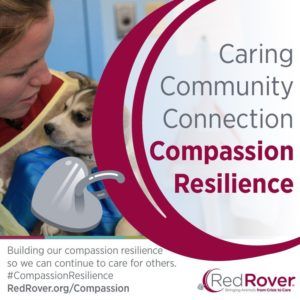Compassion Resilience
June 21st, 2021

Many of us working in animal welfare are all too familiar with compassion fatigue—the feelings of depression, sadness, exhaustion, anxiety and irritation often experienced by people who devote their lives to helping animals and witness some awful stuff along the way.
The term was first used in 1992 by Carla Johnson in a study about burnout in nurses; since then, compassion fatigue has been studied in many contexts, including the medical field, emergency response and animal welfare. However, rather than thinking of compassion fatigue as something to be avoided or fixed, it may be more powerful to figure out how to feed and grow your “compassion resilience.”
Compassion resilience is the ability to maintain your physical, emotional and mental well-being while responding compassionately to the suffering of others. Think of this resilience as a reservoir of well-being that you can draw upon on difficult days and in difficult situations. It allows you to be present and effective in heart-wrenching situations, as well as on those days when everything goes right.
You probably already have immense compassion resilience. The very fact that you are living in this world and working to help animals proves this. Without huge compassion resilience you likely would not be here—still caring, still helping animals.
We all have our own ways of filling this well of compassion resilience. However, we can be more conscious of what we’re adding to our reservoir. We can also learn about thoughts and behaviors that undercut our resilience. Being aware lets us make the right choices.
Building Compassion Resilience
Feeling better through increased compassion resilience is an active process, one that you can undertake. Keep a couple of things in mind: First, strengthening your compassion resilience is up to you and no one else. Try to think of this as a freedom, not a burden. If you set your mind to this, no one can keep you from succeeding.
Second, be a scientist about tracking and managing your resilience. What fills your tank? What drains it? Try these strategies; take them for a spin and see what works best for you.
Try out the following strategies and see what works for you.
Reframe how you look at events—view people and events in a way that sustains rather than drains you
This is perhaps the single most powerful way to feel better as you do animal welfare work, but it can be a tricky concept to grasp. People do not respond to what happened; rather, they respond to their belief about or interpretation of what happened.
Suppose “what happened” is that you were fired from your job as a shelter manager. Most people think their reaction (C—the emotional consequence) is automatic. They become upset, angry, scared—or maybe relieved. But most people are unaware that it is really their belief about what happened—what they think it means—that determines their reaction.
Consider how you might feel if you really believed, “This is not fair! They are jerks and can’t do this to me.” You’d feel angry, most likely. What if your firing caused you to think, “I am a failure. Everyone will see that I am a failure”? Shame, humiliation and embarrassment would likely flow from this belief.
But what if you did not believe the first two things and instead thought, “Wow. This job may not have been right for me. Now I am free to move on”? You’d be feeling relief, perhaps even a sense of freedom.
Reframing is powerful. It helps you recognize what really gets you upset about people and events—it is not what happened, but what you think about what happened. It involves challenging beliefs that weaken you and transforming them into ones that sustain you. It requires being realistic—in the true sense of the word.
For example, let’s say your belief about getting fired is that it happened because you’re incompetent. That’s a B that leaves you feeling ashamed and weak. This alone weakens your compassion resilience. How could you reframe and challenge this B into one that sustains you?
You could ask yourself, “How does losing this job as a shelter manager actually prove that I, as a person, am incompetent? It doesn’t. It just makes me a person who needs to learn certain things to successfully work as a shelter manager.” Then you might see that you simply need to learn more about managing people or increasing animal placement, for example.
The change in how you actually experience being fired is huge—while you still may feel disappointed, you are in charge of your fate.
Reframing is crucial to maintaining compassion resilience—you will feel so much better as a result. Having beliefs that result in feelings of hopelessness, futility, shame and weakness can make you see yourself as a victim, but when you reframe an event, you are becoming an active agent in your own life. Reframing is the basis of cognitive-behavioral therapy, and there are many resources to continue your learning and growth.
Manage your own reactions—don’t let others or situations run you
Once you understand that it is your own thoughts about what happened that determine your experience, you move from being at the mercy of others’ actions to being in control of yourself. In short, if a person or situation drives you crazy, quit handing them the “car keys” to your emotional well-being.
Let’s say I regularly get angry when my co-worker shows up late, and I end up having to clean the kennels by myself without help. It happens, I get mad—possibly lashing out at her, or maybe showing up late myself as a pre-emptive strike. Maybe I brusquely complete the kennel cleaning, angry and scaring the dogs as I work.
Managing my reactions means that I remind myself that I am in charge of myself—I can change my belief about my colleague from “That person is a jerk!” to something like “I don’t like it when she is late, but it doesn’t control me.” I go from being enraged to being disappointed or merely irritated. The situation no longer runs me.
Managing my own reactions does not mean that I give up, or that I have to just live with it—whatever it is. Ironically, managing my reactions actually makes it more likely that I can change a situation than when I am simply reactive. Think about when you are the most effective—is it when you are in a blind rage or when you are calmly motivated?
Be relentless in finding meaning that sustains you—no matter how difficult the situation
This involves being able to see a purpose, a meaning, that sustains you, no matter how difficult or horrible the situation appears. If you are suffering but find meaning in a situation, then you won’t despair—a nice way of saying you will have resilience.
Finding meaning in difficult situations is a personal quest. It can’t be what someone else tells you, and it can’t be something you don’t actually believe. When you find it, you’ll know. It will resonate inside and lift you up; it will change your entire perception from despair to possibility.
For example, Viktor Frankl, a Viennese psychiatrist who was imprisoned in a Nazi concentration camp during World War II, credited his survival to finding a meaning in the camps that sustained him. In his 1959 book Man’s Search for Meaning, he related how he found meaning by actively choosing to help others in the midst of that hell on Earth. He also wanted to survive because he had a manuscript to publish that he thought would help many people. As he said later, “He who has a why can bear almost any how.”
Here are some other, less stark examples. Frankl was counseling a man whose wife of many decades had died two years earlier and who found the loss too much to bear. Frankl asked him what would have happened if he had died before his wife. The man realized she would have been devastated. He discovered meaning in his difficult situation—by surviving his wife, he in essence spared her from the very loss he was struggling with.
A veterinarian who specialized in providing end-of-life care once told me that, to her, it felt like a privilege to be there for the animal and their person at this most difficult point. “Being of service in a difficult time” was the meaning that fueled her compassion resilience.
Keep in mind that the meaning you discover must be real to you for it to have power in your life. It should resonate within you based on your deepest values, rather than being based on platitudes or what you “should” think. You know you’ve found it when you have that “aha” moment: when you actually feel your load lighten.
This meaning is your North Star, the powerful “why” that will guide you through even the most difficult situations. Be relentless in finding meaning that sustains you.
Self care—physical and emotional
You do wonders for your compassion resilience—for your ability to remain well when caring for others—by simply taking care of yourself. Your physical and emotional well-being requires care and attention—and you know well enough the things to do: eat well, get enough sleep, exercise and spend time with friends. If you aren’t doing these things, the question to ask yourself is, “Why not?”
Remember, people are animals, too—you deserve care.
Emotions are contagious—you get back what you give out
Psychological studies show that emotions are contagious. When an angry person enters a room, everyone becomes on edge. Heart rate, respiration and anxiety all increase. So pay attention to what you bring to a situation. When you are providing an orientation to volunteers, and some of them complain about their tasks, check in with yourself: Am I angry? Scared? Resentful?
Whatever emotion you bring to a situation is likely to spread to others, and you’ll likely get it back from them. Anger can bring out angry reactions in others. Likewise, you can bring peacefulness, patience and calmness. When you do, you’ll more likely have a calm and pleasant interaction. Fewer unpleasant interactions and more pleasant ones increase your well-being.
Connecting with others strengthens your resilience
Remember, compassion resilience is the ability to maintain your own well-being while responding compassionately to the suffering of others. Humans simply are not able to do this completely on their own. Talking with others—even a single, trusted other—and sharing your feelings and experience is essential to maintain your own wellness. When you are able to share your most difficult feelings and experiences with another, and receive understanding in return, your resilience is strengthened.
When dealing with someone difficult—remember you’re dealing with that person’s best coping mechanism
When you are doing animal welfare work and experience others’ anger, verbal attacks and ridicule, you are experiencing the effects of that person’s best way to cope with their difficult situation. It may not be that person’s best behavior, but it’s the best they can manage right now. It doesn’t make their reaction right, just more understandable.
Let’s say you are working at your shelter’s front desk when a man walks in to surrender a cat. As you ask him the standard background questions about the cat, he gets angry and sarcastically says you’re giving him “the third degree” and accusing him of animal abuse. (You hadn’t.) His defensiveness and verbal attack are possibly the best way he knows to deal with feeling guilty (about relinquishing his pet) or feeling scared (about the cat’s fate). He handles these very uncomfortable feelings by lashing out, picking a fight and creating conflict (which is a huge distraction from what he’s really upset about).
In psychological terms, a maladaptive coping mechanism is one that doesn’t work, doesn’t help solve the problem and brings even more suffering upon the person. But it is the best way that person has to cope with X (whatever X is).
Just knowing this can help you deal with difficult people.
Consider practicing radical kindness
“Radical kindness” means being kind to someone for no other reason than that as a living being, they deserve it. It is an expression of our highest nature.
What we think of as kindness is sometimes transactional kindness—we are kind or helpful to get something in return: a positive self-image or a return favor. We think there is a class of people who deserve kindness and others who do not. For example, the dedicated trap-neuter-return volunteer who brings in cats for your spay/neuter program is a saint, and deserves patience and kindness. However, you may think the family who surrenders their elderly dog at your shelter is neglectful and therefore does not deserve any compassion or kindness.
How we treat people we think don’t deserve kindness affects our compassion resilience. If we are unkind to them (even just in thought) our own well-being and resilience diminish. Our true nature is kindness and compassion, and when we act against that, we suffer.
For further reading, the author recommends:
- A Guide to Rational Living by Albert Ellis & Robert Harper
- Feeling Good by David Burns
This can be a challenging concept, and for us animal lovers it might help to remember that people are animals, too. We work so hard for animals, love them, show them kindness—because they deserve it, and for no other reason. People, even the difficult ones, deserve our kindness. As the saying goes, “Be kind, for everyone you meet is fighting a hard battle. Everyone is struggling on some level or another.”
Following the Signs
This list is not exhaustive, and not every method works for everyone. Play around and experiment. See what works. Think of these as exercises, but instead of building muscle or cardio capacity, you are building resilience.
Animal welfare work is performed by some of the most kind, sensitive and compassionate people around. But the very qualities that draw us to care for animals can make us more susceptible to the suffering and heartbreak the work inevitably involves. Our bodies and minds (thankfully) give us signals when we are compassion fatigued. We can take on practices to fill this pool of resilience and create a steady source of well-being that will see us through difficult times.
___
About the Author
Beth Gammie has a Master’s degree in Counseling and is the Director of Field Services for RedRover.
This article originally appeared as “The Flip Side of Fatigue” in Animal Sheltering magazine (November/December 2015), The Humane Society of the United States.



